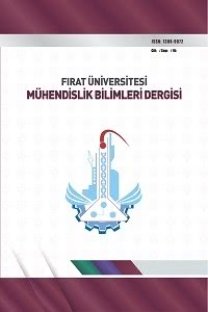Diyabet Hastalıkları İçin GA-DÇF-UÖM Tabanlı Uzman Tanı Sistemi
Uç Öğrenme Makinesi, Dalgacık Çekirdeği, Genetik Algoritma, Diyabet Hastalıkları Veri Kümesi, Teşhis Sistemi
___
- [1] American Diabetes Association. (2014). Diagnosis and classification of diabetes mellitus. Diabetes care, 37(Supplement 1), S81-S90.
- [2] American Diabetes Association. (2014). Standards of medical care in diabetes—2014. Diabetes care, 37(Supplement 1), S14-S80.
- [3] Johnson, R. J., Nakagawa, T., Sanchez-Lozada, L. G., Shafiu, M., Sundaram, S., Le, M., ... & Lanaspa, M. A. (2013). Sugar, uric acid, and the etiology of diabetes and obesity. Diabetes, 62(10), 3307-3315.
- [4] K. Polat, S. Gunes and A. Arslan, (2008). A cascade learning system for classication of diabetes disease: Generalized Discriminant Analysis and Least Square Support Vector Machine, Expert Systems with Applications 34, p.p.482–487.
- [5] K., Kayaer, & T. Yıldırım, (2003). Medical diagnosis on pima indian diabetes using general regression neural networks, artificial neural networks and neural information processing (ICANN/ICONIP) (pp. 181–184), Istanbul, Turkey, June 26–29.
- [6] K.P. Bennett, J. Blue, A Support Vector Machine Approach to Decision Trees, R.P.I Math Report No. 97-100, Rensselaer Polytechnic Institute, Troy, NY, 1997.
- [7] Friedman N, Geiger D, Goldszmit M (1997). Bayesian networks classifiers. Machine Learning 29: p.p.131-163. [8] Avci, D. (2016). An Automatic Diagnosis System for Hepatitis Diseases Based on Genetic Wavelet Kernel Extreme Learning Machine. Journal of Electrical Engineering & Technology, 11(4), 993-1002.
- [9] G. B. Huang, Q.-Y. Zhu and C.-K. Siew, “Extreme Learning Machine: Theory and Applications”, Neurocomputing, vol. 70, pp. 489-501, 2006.
- [10] N.-Y. Liang, G.-B. Huang, P. Saratchandran, and N. Sundararajan, “A Fast and Accurate On-line Sequential Learning Algorithm for Feedforward Networks”, IEEE Transactions on Neural Networks, 17 (2006) 1411-1423.
- [11] Al-Shayea, Qeethara Kadhim. "Artificial neural networks in medical diagnosis", International Journal of Computer Science Issues 8.2 (2011): 150-154.
- [12] Whitley, D. (2014). An executable model of a simple genetic algorithm. Foundations of genetic algorithms, 2(1519), 45-62.
- [13] Xiong, H. Y., Alipanahi, B., Lee, L. J., Bretschneider, H., Merico, D., Yuen, R. K., ... & Morris, Q. (2015). The human splicing code reveals new insights into the genetic determinants of disease. Science, 347(6218), 1254806.
- [14] Goldberg, D. E. (2006). Genetic algorithms. Pearson Education India.
- [15] Bin Li, Xuewen Rong and Yibin Li, “An Improved Kernel Based Extreme Learning Machine for Robot Execution Failures”, Hindawi Publishing Corporation The Scientific World Journal, Volume 2014, Article ID 906546, pp. 7, http://dx.doi.org/10.1155/2014/906546.
- [16] Peng Guan, De-Sheng Huang, Bao-Sen Zhou, Forecasting model for the incidence of hepatitis A based on artificial neural network, China World Journal of Gastroenterol; 10(24), 2004, pp. 3579-3582.
- [17] Polat K., Gunes S., Hepatitis disease diagnosis using a new hybrid system based on feature selection (FS) and artificial immune recognition system with fuzzy resource allocation, Digital Signal Processing 16 (2006), pp. 889–901.
- [18] J. Beyer, J. Schrezenmeir, G. Schulz, T. Strack, E. Küstner, G. Schulz, The influence of different generations of computer algorithms on diabetes control, Computer Methods and Programs in Biomedicine, Vol. 32, Issues 3-4, July-August 1990, Pages 225-232.
- [19] http://www.phys.uni.torun.pl/kmk/projects/datasets.html ((last accessed: April 18, 2011).
- [20] Robin, X., Turck, N., Hainard, A., Tiberti, N., Lisacek, F., Sanchez, J. C., & Müller, M. (2011). pROC: an open-source package for R and S+ to analyze and compare ROC curves. BMC bioinformatics, 12(1), 77.
- [21] Fawcett, T. (2006). An introduction to ROC analysis. Pattern recognition letters, 27(8), 861-874.
- [22] Smith, S. M., & Nichols, T. E. (2009). Threshold-free cluster enhancement: addressing problems of smoothing, threshold dependence and localisation in cluster inference. Neuroimage, 44(1), 83-98.
- [23] Matlab 7.7.0, MATLAB Company, 2011.
- [24] Ertam, F., & Avcı, E. (2017). A new approach for internet traffic classification: GA-DÇF-UÖM. Measurement, 95, 135-142.
- [25] Ding, S., Zhang, J., Xu, X., & Zhang, Y. (2016). A wavelet extreme learning machine. Neural Computing and Applications, 27(4), 1033-1040.
- ISSN: 1308-9072
- Yayın Aralığı: Yılda 2 Sayı
- Başlangıç: 1987
- Yayıncı: FIRAT ÜNİVERSİTESİ
JPEG Algoritmasının Performansını İyileştirmek İçin Bir Yöntem
Bağdere Tufası’nın Jeolojik, Jeokimyasal ve Jeokronolojik Özellikleri (Elazığ, D Türkiye)
Serap ÇOLAK EROL, Ercan AKSOY, Mehmet ÖZKUL
Yüksek Dayanımlı Betonların Erken Yaş Dayanımının RSM Metodu Kullanılarak Belirlenmesi
Tuba DEMİR, Muhammed ULUCAN, Kürşat Esat ALYAMAÇ
Nehir Tipi Hidroelektrik Santrallerinde Rampa Olayları Türkiye Örneği
İsrafil KARADÖL, Mustafa ŞEKKELİ
Derin Öğrenme Temelli Robotik Maske Kontrol Sistemi
Türkçe Tweetler için Derin Özellik Çıkarımı Tabanlı Yeni Bir Duygu Sınıflandırma Modeli
Mehmet Umut SALUR, İlhan AYDIN
Sürü İnsansız Hava Araçlarının Görev Paylaşımı için Genetik Algoritma Tabanlı Bir Yaklaşım
Mutlu OKCU, Müjdat FIRAT, Yasin VAROL, Şehmus ALTUN, Okan ÇELİK
